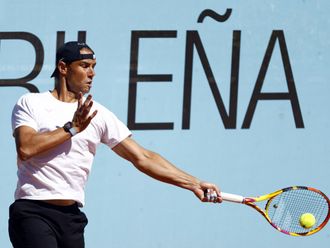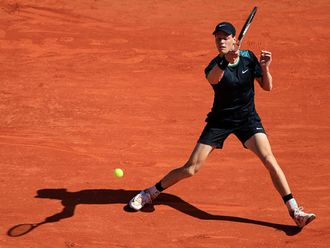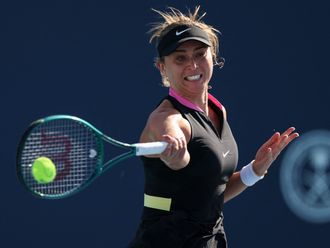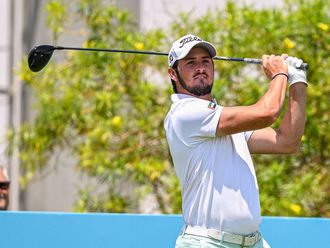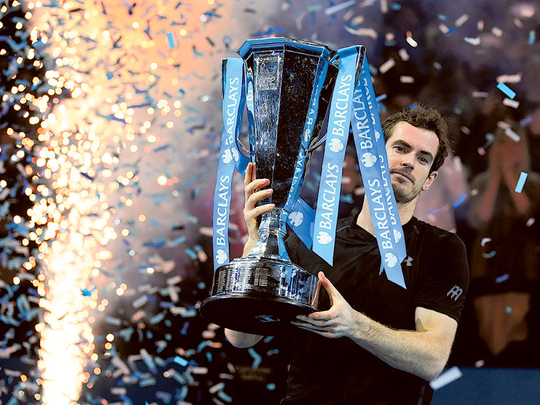
London: “Made it, Ma. Top of the world.” Andy Murray did not quite go full James Cagney on us, but the sentiment was clear enough as he looked disbelievingly towards his mother Judy in the crowd, flexing a single finger to denote his supremacy. No. 1, not just for a week but for Christmas, too.
This time, there could be no gripe that he had scaled the summit by some statistical quirk.
No, this was dominance writ large, as Murray asserted his alpha-male standing with the same ruthlessness he had shown since midsummer, scattering his rivals like a runaway freight train.
Where Novak Djokovic had once looked poised to inhabit the game’s stratosphere by himself, Murray has not just joined him but usurped him.
Over 8,000 points behind his nemesis in the rankings in June, after defeat by the Serb in the French Open final, he has pulled off a warp-speed annexation of power.
He espied Djokovic’s vulnerabilities and entered every late-season event he felt physically able to compete in, winning them all.
Last night’s coronation as world No. 1 marked the completion of one of the most remarkable coups in sport.
He is a devotee of boot-camp chic these days, dressed head to foot in black and mossy green, with his ankles strapped up like a commando.
The look is not just for show. Murray submits to a regime of monkish self-denial to become such a specimen.
Next month, when he is a racing certainty to become the BBC’s first three-time Sports Personality of the Year, he will in all probability receive his award next to a Miami swimming pool, in between bikram yoga sessions. He has an Australian Open to consider soon, a tournament where he has finished runner-up a record five times without winning. He does not intend making it six.
This uncompromising mindset is mandatory for those at the apex of their craft.
For a decade, Murray has followed diligently in the contrails of three of the greatest players who ever lived, paying ever more diplomatic tributes to their genius.
Those days as the reluctant bridesmaid are over. With even Djokovic displaying unheard of flashes of vulnerability, Murray has a narrow window of time, before his own powers start to attenuate, to press home his claims to pre-eminence. Traditionally, the O2 has not been Murray’s natural habitat.
It is not just that he had suffered some flaky results here prior to this, his annus mirabilis, but that the place is altogether too slick and shiny for his taste.
He is far more comfortable at the rough-and-ready Flushing Meadows, with the aroma of giant pretzels wafting through the air, than he ever will be at this Greenwich temple of corporate sophistication.
By and large, Murray was a study in calm Sunday night. There were none of the histrionics, none of the splenetic outbursts against the injustice of the universe that he had shown in his 31/2-hour marathons against Kei Nishikori or Milos Raonic.
There was just a serene conviction that he had earned his right to be recognised as the finest player his sport could conjure.
All the popular wisdom that he might be swept away by Djokovic, having spent far longer on court to reach this moment, dissolved just as surely as his opponent’s once claw-like grip on the No. 1 perch.
Murray appeared almost bashful as the blue ticker tape fell all around him.
For this was one triumph, rather like his first at Wimbledon in 2013, of such magnitude that it was difficult to compute.
The odds had seemed impossible when he sat slumped in his chair in Paris five months ago, wondering how, or indeed if, he would ever topple the bionic man from Belgrade across the net.
Eight thousand points: that was the equivalent of winning four majors.
But the more Murray appreciated that he was in the form of his life, the more irresistible he became.
On this evidence, his winter pilgrimage to Melbourne, the place where he has come so close, so often, has scarcely looked so enticing.
When Murray next strides out at Rod Laver Arena in January, he will relish having the figure ‘1’ in brackets after his name. He might also have a ‘Sir’ in front of it.
If the country’s honours system is to have any consistency, there is little doubt that this is one sporting knighthood that should come to pass.
Sometimes, when an athlete is midcareer, such gestures can be problematic. When it happened to Bradley Wiggins at the end of 2012, it smacked of premature ennoblement.
And when Richie McCaw was ready to be anointed ‘Sir Richie’ in 2011, after the All Blacks’ World Cup glory on home soil, he famously turned it down, wary of the message it might send to his teammates.
Murray, in his oppressively individual sport, should not feel burdened by the same dilemma. Nobody in Britain would deserve investiture more.



